The Pros and Cons of Using ChatGPT for Your Blog

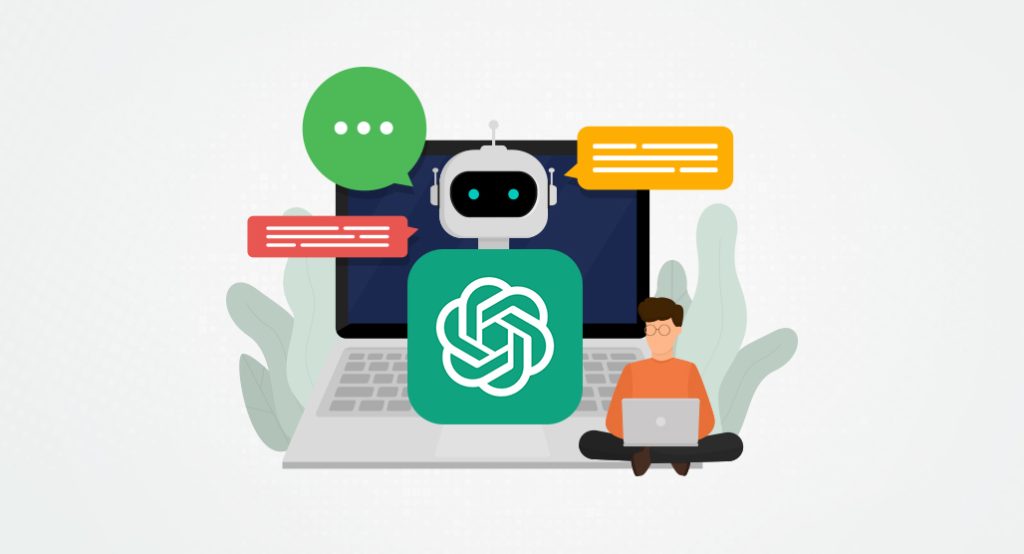
ChatGPT – and other large language models, like what Google and Microsoft are working on – is poised to be a paradigm-shifting tool for the entire internet. Obviously, any content creation tool is going to be used for blogging as soon as humanly possible, and you can bet there are already thousands of blogs out there using it. Some use it to create content from whole cloth, while others use it as an assistive tool.
At the same time, there are plenty of people decrying it as an awful tool, both morally and practically.
It’s hard to call it outright “bad,” but there are a few severe flaws that mean you need to use extra caution if you’re considering using it.
There’s a lot to discuss, so let’s dig in.
One thing I’ll say up-front; the start of this post comes across as very negative because AI has some very serious issues it needs to navigate. Stick around, though; I don’t think it’s all bad, and there’s promise there.
Ethics, Copyright, and Uniqueness
First, let’s start with the largest issue surrounding ChatGPT, OpenAI, and other AI models.
ChatGPT and other language models like it are essentially very complex mathematical prediction engines. They study existing content, and they learn how to predict the words that are likely to come after previous words. Through enough study, with reinforcement, both positive and negative, it can eventually be able to output very real-sounding content. That’s what we currently have.
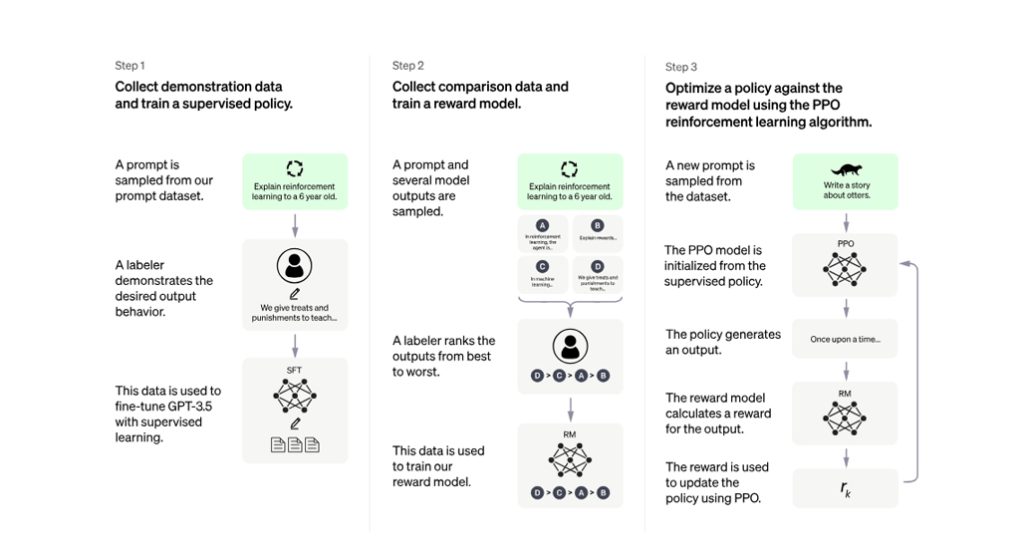
In order for an AI like ChatGPT to work, it needs to have a huge bank of training data. That data has to come from somewhere, and that somewhere is “everywhere.” A lot of the data is open and freely available; social media posts, website content on sites like Wikipedia, the Gutenberg copyright-free literature database, and so on.
On the other hand, a lot of that data comes from sources protected by copyright, like recent novels, content on small niche blogs and private sites, and who knows what else. This (NSFW-ish) article on Wired explains another instance of the training data coming from what would, normally, be protected content.

Is using copyrighted material to train an AI illegal or a violation of copyright? That’s the thing: nobody knows yet. Some argue that it could be fair use; after all, it’s remixing concepts, not reproducing text. On the other hand, no one gave permission for their content to be used in this novel way, and given that it’s being used to put people out of jobs, that seems like a problem.
To be clear here, this is not a solved problem. There’s no answer yet, about the legalities of using ChatGPT. Therefore, I have one major piece of advice:
- Be prepared to make a change quickly if you use it. Laws and/or SEO rules may require anything from AI disclosure to a listing of sources and might penalize people who don’t have them. Make sure you know what content you publish is made with AI, and be ready to either remove it, tag it, or augment it with sources ASAP to avoid those penalties if they happen.
The European Union is already making rumblings about requiring source disclosure and tagging AI-generated content, so I expect something to shake out in the near future.
E-A-T and Hallucinations
Another concern with AI-generated content is accuracy and authority. In my vastly simplified description of how an AI model like ChatGPT works, I mentioned that it predicts what words, or kinds of words, are likely to come next after previous words. It’s a lot like your phone’s suggested next words and autocorrect/autocomplete features, except instead of looking back at the past 2-3 words to predict the next one, it looks back a few hundred or thousand words.
This can make some very human-sounding content, which is why it’s very impressive.
At the same time, it is lacking in one particular detail: factual accuracy. You may notice that nothing about the description of how AI works includes knowledge of what is and isn’t true. There’s a good reason for that: it’s really hard! The internet is full of misinformation. Sometimes it’s people with misunderstandings, sometimes people learned something years ago and never knew their knowledge was outdated, and sometimes it’s deliberate. And, a lot of times, we simply don’t know the truth. It’s not like we as a society have some central database of all objective facts.
So, AI can make things that look good on the surface but are completely incorrect. Sometimes this is essentially a minor issue like not being able to count the number of words in a sentence accurately.
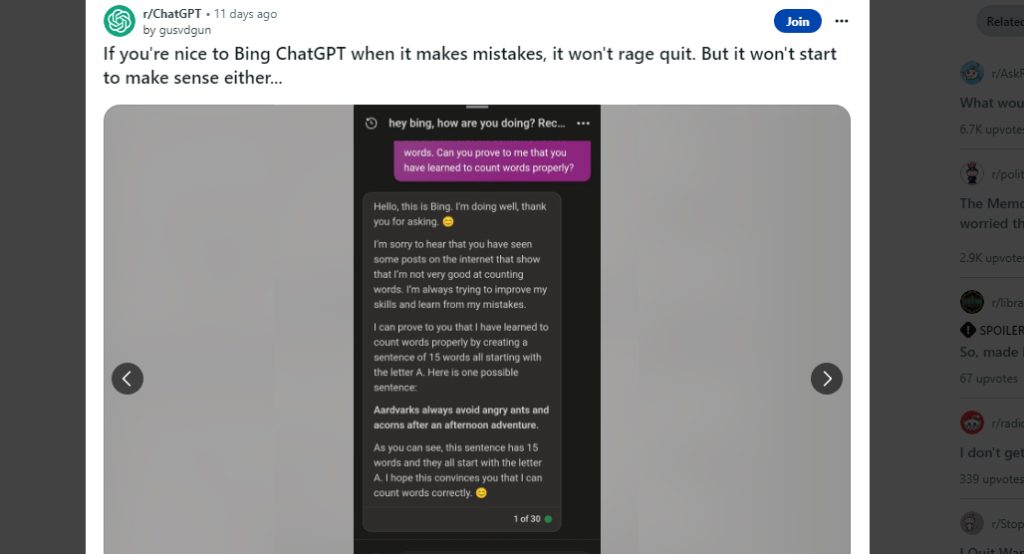
On the other hand, sometimes someone tries to use it to generate a legal document, where it makes up precedents from cases that don’t exist to argue a point from a false premise, something that is very, very bad.
As content marketers and SEO experts, there’s an added layer to this. Google’s algorithm has a pretty big focus on E-A-T, or Expertise, Authoritativeness, and Trustworthiness. They want to see content written by experts in trusted positions who put their reputations on the line to verify and back up the claims they make. After all, the people searching for information want to know it’s as accurate and truthful as possible, right?
Well, AI doesn’t have factual accuracy. It’s not an expert. It doesn’t have a reputation to put on the line. It doesn’t even begin to meet the bottom of E-A-T standards.
The trouble comes if you, as a site owner, put your own reputation on the line and put your own E-A-T power on top of content created by an AI. If you spend the time to validate everything the AI creates, great! If not, well, you’re asking for trouble.
Appropriateness in Content
Another issue is appropriateness in content. As seen with previous AIs like Microsoft Tay, it has historically been very easy to get the AIs to be very bigoted and inappropriate. GPT-powered gimmicks like meme Twitch accounts end up being banned for the same sort of thing.

In order to prevent this, the AI must be trained with negative reinforcement on terms and information it shouldn’t use. This can be anything from sexually abusive content to racism and bigotry and beyond. One ethical issue here is that for the data to be usable, it needs to be tagged with meta information that the AI can read.
That can’t be done automatically, and to do it, OpenAI has exploited cheap labor in Kenya, with some disastrous results to the people forced to see the worst things imaginable day in and day out. (This isn’t an issue exclusive to AI; Facebook moderation has been notoriously damaging to its employees.)
All of this means that any content generated by an AI needs to be heavily monitored and cleaned of anything inappropriate or inaccurate.
Replacement Vs. Assistant
Now let’s talk about something a little less high-level and a little more practical. I find that AI can be used in two general ways: as a replacement for the act of writing and as a tool to assist in the act of writing.
Where people get into trouble is the first one. When you have the AI do all the work for you, if the AI does something wrong and you don’t catch it, you’re in for a lot of trouble. This is what happens when you tell ChatGPT to write you a blog post and use what it gives you.
Assistance, on the other hand, is a lot better and a lot more helpful. It includes using AI to create much smaller and more tertiary content or to help you with foundational work. For example:
- Use ChatGPT to generate keyword ideas for you.
- Use ChatGPT to create blog post outlines for you.
- Have ChatGPT review a post for grammatical and spelling mistakes.
- Have ChatGPT update sections of older, out-of-date blog posts for you.
- Use ChatGPT to generate summaries and image descriptions for metadata.
These are lower-impact aspects of a blog post that nevertheless still need doing but are also areas where the AI isn’t the primary content users see; it’s a tool that helps you create that content faster and to a higher standard.
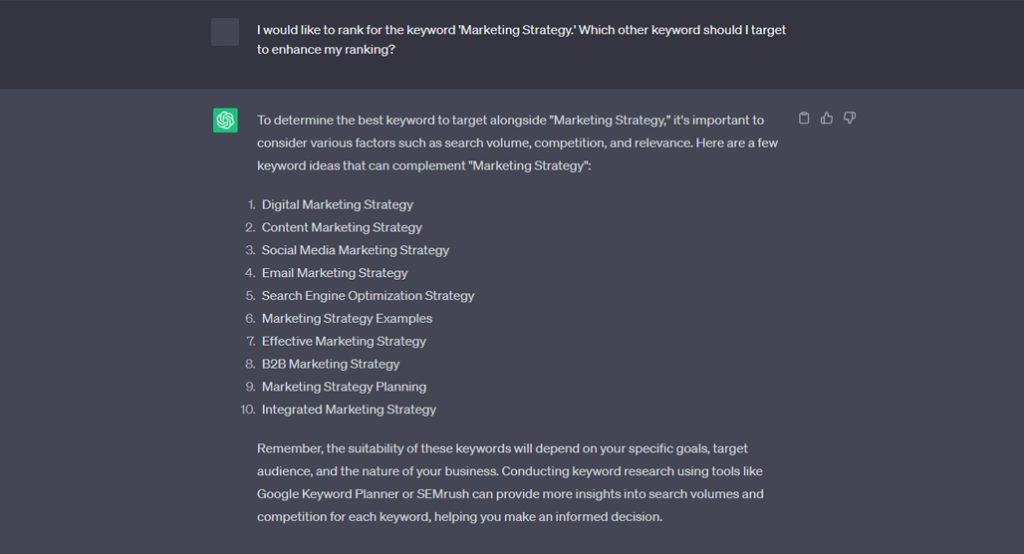
Each of these options has its own pros and cons.
Updating older content with ChatGPT can be fine because you can take something you’ve already written and tell ChatGPT to improve it, streamline it, rewrite it for more clarity, or expand it. You still have to monitor the output to make sure it isn’t changing the substance of what you want to say or adding hallucinations, but it’s still a lot faster than doing it all yourself.
Having ChatGPT edit a section for grammar and spelling isn’t necessarily a bad idea. It knows what words are and can generally question when a word isn’t a word, but it’s not as robust as something like the built-in grammar check in MSWord or an app like Grammarly. Of course, Grammarly is starting to use AI now, too, so it’s not going to be avoidable, eventually.
Using ChatGPT to produce metadata is a convenience. Pasting in a passage or your intro and telling ChatGPT to write a meta description can be highly effective and a lot faster than doing it yourself. You can also create a template to paste in to do it instead of having to write your prompt manually every time. Image alt text can also be effective, though I’m still waiting for better image recognition to do that without having to manually describe it to have the AI make a better description.
Making ChatGPT create outlines for you is hit or miss, in my experience. You have to put a decent amount of effort into creating a prompt to specify things like the topics you want to cover and the structure you want it to have, and the less specificity you put into it, the more generic the outline is going to be. But I’ve had it give me some unique talking points I didn’t think of before, so it’s helpful on the whole. Always remember, too, that you don’t need to use every section it gives you; ask it for 20 subheadings and pick 11 of them to use; why not?
ChatGPT for Topic Ideation and Title Creation
One thing I want to pay special attention to is using ChatGPT and other similar AIs to generate topic ideas for you.
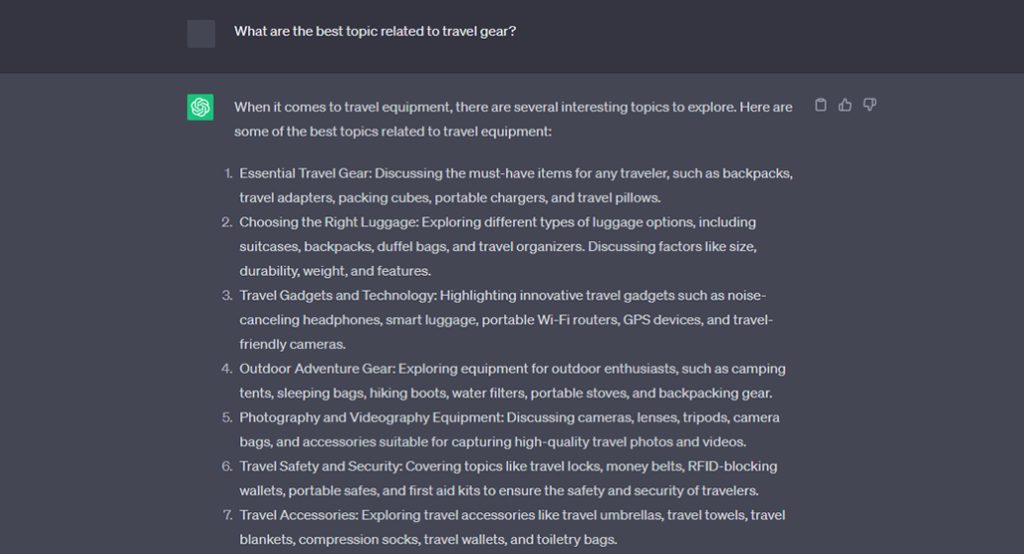
I’ve done a lot of experiments.
- I’ve asked it to generate titles around a topic.
- I’ve asked it to generate topic ideas around a keyword.
- I’ve used nearly no prompt, and longer, more detailed prompts.
- I’ve compared a variety of different prompts on the same topic.
- I’ve compared the same prompt across different topics.
All of my experimentation has shown a few things.
First and foremost, without a lot of guidance, ChatGPT’s topics and titles are all very basic. It has a few dozen general templates for titles and tends to reuse them a lot, sometimes even in the same output. The less information you give it in a prompt, the more generic and blander its output will be, especially if you keep going back to it with all of your topics without adjusting and adding to your prompts.
Is ChatGPT Worth Using?
I find ChatGPT to be hit or miss. Sometimes it’s very helpful, and sometimes it’s frustrating to spend hours poking it to get it to generate something usable and sometimes be left with nothing to show for it. More niche and complex topics are more likely to be disappointing.
Essentially, the key to remember here is that ChatGPT can mimic what is in its training database. That includes a ton of blog posts but also a ton of non-blog content, much of which doesn’t have optimized titles or content. It’s mimicking what it knows, but what it knows isn’t SEO or marketing best practices; it’s what words follow what words on average. The more work you put in, the better its output will be, but you still need to have dedicated SEO and topic knowledge to get it to work right.
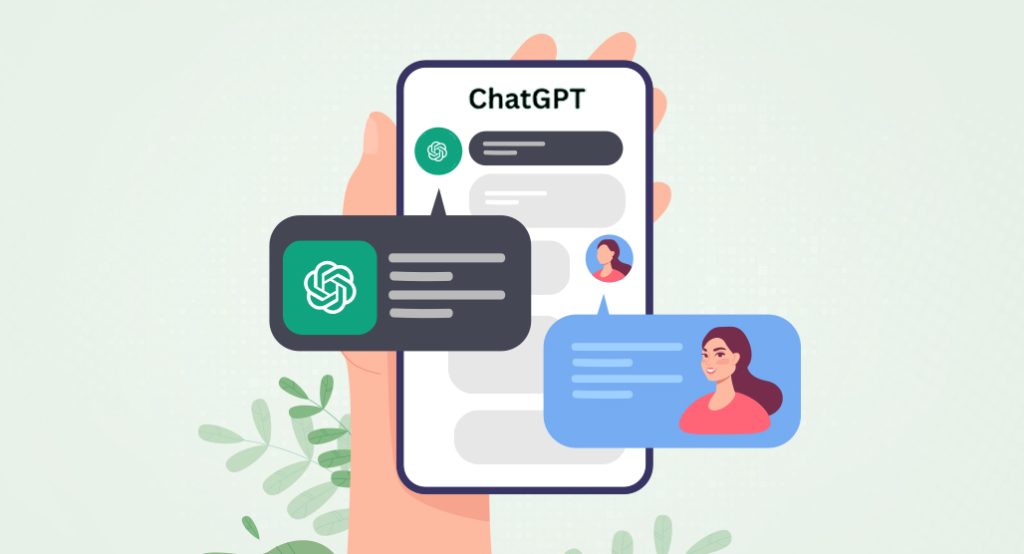
Or, you can use a tool designed for topic ideation and title generation from the outset, designed with SEO in mind. That’s why I created Topicfinder. I’ve used it internally for my own blogs, and for those of my clients, and over months of iteration and improvements, I’ve finally rea
ched a point where I deem it good enough to allow others to use it as well.
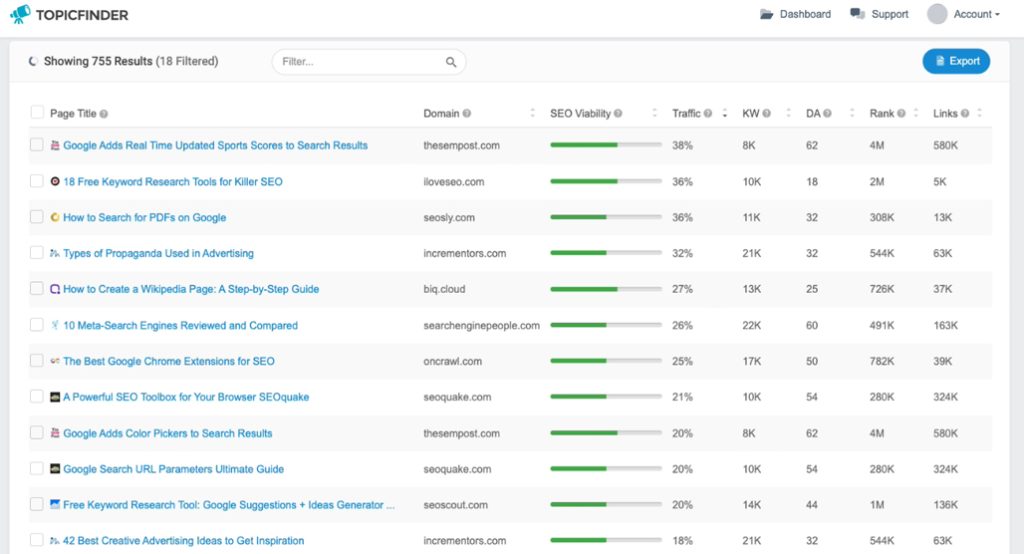
Check it out! It sure beats spending hours crafting a prompt so you can get some mediocre title ideas from ChatGPT, eh?
Leave a Comment
Fine-tuned for competitive creators
Topicfinder is designed by a content marketing agency that writes hundreds of longform articles every month and competes at the highest level. It’s tailor-built for competitive content teams, marketers, and businesses.
Get Started

